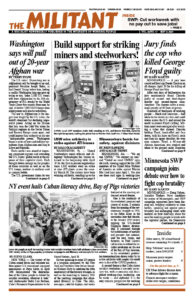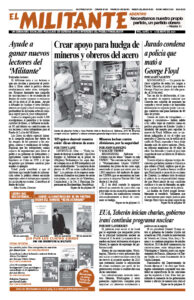Cuban Ambassador to the UN, compañero Pedro Luis Pedroso
Compañeros and compañeras of Cuba’s UN Mission
Compañeros and compañeras of the Socialist Workers Party
Friends of Cuba, Puerto Rico, and sister countries:
My warmest greetings to all of you. I am immensely honored to send this message for the commemoration in New York of the 60th anniversary of Cuba’s victory at Playa Girón, which I am doing in memory of someone who so deeply loved Cuba and admired its revolution, the Puerto Rican patriot Rafael Cancel Miranda.
The ties that link Rafael Cancel Miranda and Cuba extend from his arrival in Santiago de Cuba in mid-1951, to the end of his life on March 2, 2020. He arrived in Santiago as an exile, barely 21 years old, to continue fighting for the freedom of Puerto Rico in the country that became his second homeland.
He traveled by bus from Santiago to Havana, where he resided for 14 months. It was during the government of Carlos Prío Socarrás, who ignored the US embassy’s demand that Cancel Miranda be turned over because he was accused of draft evasion. This despite already having served two years at the federal prison in Tallahassee, Florida, for the same supposed crime.
Cancel Miranda’s stay in Cuba ended abruptly after March 10, 1952, when Fulgencio Batista overthrew the Carlos Prío Socarrás government and imposed a dictatorship. In an interview in the July 21, 2006, issue of Granma newspaper, Cancel Miranda described how he had approached Aracelio Azcuy, a Cuban politician who appeared to sympathize with the revolutionary movement, asking him for a weapon from the collection Azcuy kept in his office. Cancel Miranda’s intention was to join the rebels. Azcuy tried to dissuade him and refused to give him a weapon.
Cancel Miranda was not able to find a way to link up with the rebels. In the interview he recalled with some nostalgia that, had he succeeded, he might have been part of the assault on the Moncada barracks.
Five months after the coup, in August 1952, after a renewed demand by the US embassy, Batista ordered Cancel Miranda arrested along with other Puerto Rican Nationalist Party members exiled in Cuba. Held at Tiscornia prison, days later he was deported to Puerto Rico and arrived home August 25, 1952.
On his return he was arrested, but by the end of 1952 he was able to move to New York. The federal authorities were on his trail, but they didn’t anticipate the events of March 1, 1954, the armed attack on the US House of Representatives carried out by Cancel Miranda and his fellow commando members: Lolita Lebrón, Irvin Flores Rodríguez, and Andrés Figueroa Cordero.
Against all expectations, the four survived the attack, and they were given long prison sentences. Rafael was sentenced to 84 years and sent to the notorious Alcatraz prison, on a small island off the coast of San Francisco, California. He was there from 1954 to 1960, completely isolated from the world. There was no TV, no newspapers. Visits were rare or nonexistent.
In 1960 he was transferred to the federal prison in Leavenworth, Kansas, where he finally learned about the victory of the Cuban Revolution when he watched a parade on an American TV news broadcast. Cancel Miranda later explained that he began to carefully follow news programs and the press to try to understand the new situation in Cuba, until he became convinced the revolution that had triumphed in January 1959 was “for real,” as he used to say.
From then on, Cuba and its revolution became a source of light and hope for Cancel Miranda. He found that he could tune in to Radio Havana Cuba late at night, with a small transistor radio that he put against the cell window. He started to receive the newspaper Claridad, which regularly carried a wealth of information about the advances of the revolution.
For Cancel Miranda, behind bars in the empire’s prisons, Cuba was living proof that it’s possible to teach an entire people to read and write and provide quality education, health care, culture—in short, to build a better world for everyone.
Cancel Miranda and his comrades were released from prison on September 10, 1979. An intense campaign had been waged in Puerto Rico, the US, and progressive countries around the world. Cuba was at the forefront, honoring the historic ties of solidarity and struggles for freedom that have bound our two nations together since the time of José Martí.
As the campaign reached a high point and President James Carter still had not announced a commutation of the sentences, Fidel offered the unthinkable—to release some US spies jailed in Cuba in exchange for the freedom of the Puerto Rican Nationalists. He asked for nothing in return for Cuba. The prisoner exchange took place with the utmost discretion and the world only learned of it years later.
In October 1979, Cancel Miranda and his comrades were welcomed in Cuba with full honors. They were decorated, personally by Fidel, with the “20th Anniversary of the Cuban Revolution” Medal. Afterward Cancel Miranda visited Cuba many times. But his first experience seeing a joyous people who with deep pride would point to the gains of their revolution—so different from the Cuba he had witnessed 28 years earlier—marked him forever.
I think that from then on, not a year went by that he didn’t travel to Cuba. He cultivated great friendships, took part in many conferences and rallies, and defended Cuba at all forums where he could speak. In 2006 Cuba’s revolutionary government granted him one of the highest honors of his life: the Order of José Martí, which he was awarded by his Cuban brother Ricardo Alarcón de Quesada.
Cancel Miranda never had a passport because he refused to travel with a document identifying him as a US citizen. He would say, “I’m Puerto Rican, period!” He eventually carried a Nicaraguan passport, and offers by Cuba and Venezuela, but he remained firm about returning to Puerto Rico from his trips as a Puerto Rican citizen. For years he traveled, whenever possible, with his birth certificate and driver’s license as his ID.
In 2009 the US government began to require a passport for everyone traveling internationally, which meant Cancel Miranda could no longer travel outside US territory. Even then, he continued his struggle for Puerto Rico and the Sister Homeland. He raised his voice to denounce the criminal blockade against Cuba and in defense of the Five Cuban Heroes. In Puerto Rico he was always there, speaking out to demand the release of the Cuban Five, and he traveled many times to US cities to take part in events sponsored by the International Committee for Justice and Peace, which worked tirelessly for the release of our Cuban brothers.
Cuba and its revolution were in his thoughts and heart to the end. The Cuban flag accompanied him next to the Puerto Rican flag at his funeral. Love for Cuba is an essential part of the legacy he leaves his family and fellow Puerto Rican fighters.
And in case anyone in the world still harbors the wild dream of trying to break the spirit of Playa Girón among the Cuban people today, Rafael Cancel Miranda has a warning for them: “¡Tírate, que está llanito!” Go ahead, just try!
We continue to march alongside the Cuban people. ¡Hasta la victoria siempre!
In memory of Rafael Cancel Miranda,
María de los Ángeles Vázquez

